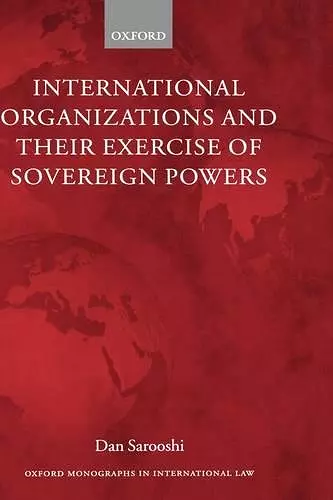International Organizations and their Exercise of Sovereign Powers
Format:Hardback
Publisher:Oxford University Press
Published:14th Jul '05
Currently unavailable, and unfortunately no date known when it will be back
This hardback is available in another edition too:
- Paperback£68.00(9780199225774)

Winner of the 2006 American Society of International Law Book Prize and the 2006 Myres S. McDougal Prize awarded by the American Society for the Policy Sciences
Provides a conceptual and legal analysis of one of the most important challenges facing international organizations: their exercise of sovereign powers. This book examines the exercise of sovereign powers by organizations such as the United Nations, the World Trade Organization, and the European Union.This book provides a conceptual and legal analysis of one of the most important challenges facing international organizations today: their exercise of sovereign powers. The book examines the exercise of sovereign powers by organizations such as the United Nations, the World Trade Organization, and the European Union. It makes a significant contribution to the content of the law that governs both the exercise of sovereign powers by international organizations and the relationships between organizations and their Member States. The book also tackles the fundamental question of what values should constrain international organizations in their exercise of sovereign powers. These sovereign powers have been conferred on international organizations by States and may include the full range of executive, legislative, and judicial powers. Sarooshi develops an innovative three-tiered typology of conferrals which ranges from agency relationships, to delegations of powers, to full transfers of powers. These categories prove useful in answering a number of legal issues that arise out of the relationships between international organizations and their Member States. These include: When an international organization exercises conferred powers, does it do so on its own behalf or on behalf of the State? Whose legal relations are changed by the exercise of powers: the State's or the organization's? In the case where the State has retained the right to exercise powers it has conferred on an organization, whose interpretation of the powers will prevail in the case of a conflict that arises from the concurrent exercise of powers? What fiduciary duties are owed by the organization and Member States towards each other? And who is responsible for breaches of international law that may occur as a result of the organization's exercise of conferred powers: the State or the organization or both? These issues lead on to a consideration in the book of the measures available to a State under international law when it wants to try and change the way that an organization is exercising conferred powers.
This study confirms Professor Sarooshi as a leading writer today in the field of international organizations - a field in which he has immersed himself and taken on the challenge of its ever expanding and deepening nature. As with The United Nations and the Development of Collective Security, he has married impressive knowledge of detail with original conceptual thinking. The result is a book that is at once informative and challenging. * President and Judge Rosalyn Higgins DBE, QC, International Court of Justice *
This may be the most important future terrain for international law generally, and will also certainly challenge some of the fundamental assumptions of general international law. This is a path breaking work that provides important insights which practitioners and scholars will need as the world struggles with change and circumstances creating enormous risks but also great opportunities in the wake of economic, political, and scientific forces beyond the traditional controls available to individual nation states. * Professor John H. Jackson, Georgetown University Law Center *
The clarity and thoroughness of his analysis provides a firm foundation for the development of the law in this important area. * Professor Vaughan Lowe and Professor Ian Brownlie QC (Emeritus), Series Editors' Preface *
The backing of such a renowned and acclaimed author like Dan Sarooshi will undoubtedly shore up the credibility of such a progressive proposal. * Global Law Books *
Professor Sarooshi has examined in rich detail the many modes by which national powers are being conferred, transferred or delegated to international organizations to the point that sovereignty itself has become a "contestable" concept. This is an original and important book. * Professor Michael Reisman, Yale Law School *
- Winner of Winner of the 2006 American Society of International Law Book Prize and the 2006 Myres S. McDougal Prize awarded by the American Society for the Policy Sciences.
ISBN: 9780199283255
Dimensions: 242mm x 162mm x 16mm
Weight: 407g
176 pages